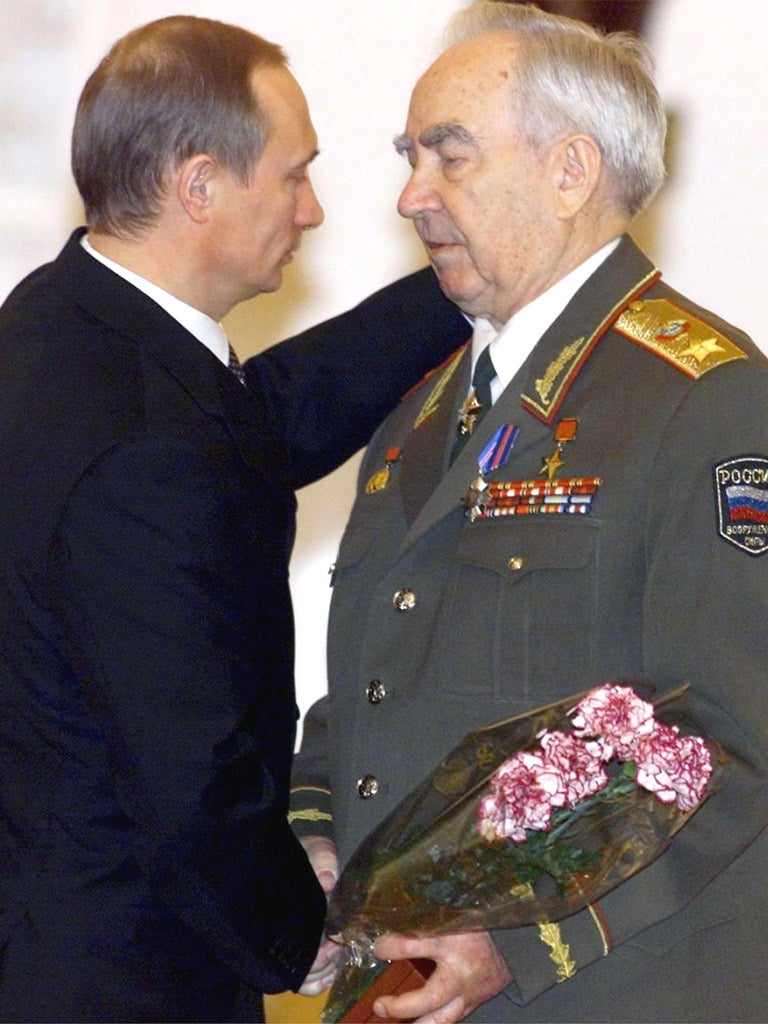Marshal Viktor: Kulikov Soldier and key figure in the Warsaw Pact

Viktor Kulikov was among the very last survivors of the old Soviet military establishment, a Second World War veteran unswerving in his lifelong communism and suspicion of the West, who rose to be the top commander of the Warsaw Pact and a key figure in the crisis that led to the imposition of martial law in Poland in 1981.
Born of peasant stock, Kulikov joined the Soviet military in 1939, and between 1941 and 1945 fought on the Eastern Front as a tank commander. His career, however, truly took off in the Brezhnev era. By 1967 he was commander of the important Kiev military district. Two years later he was put in charge of Soviet forces in [East] Germany, and two years after that was named chief of the General Staff of the Soviet Armed Forces, the third ranking officer in the country's military hierarchy.
It was a mid-Cold War golden age for Soviet power. The military was boosted by new weapons and technology, while the debilitating involvement in Afghanistan still lay in the future. Moscow's superpower adversary, meanwhile, was being sapped by the Vietnam war and domestic political turmoil. Bemedalled, burly and bushy-eyebrowed, Kulikov epitomised this confidence.
In 1977 he was promoted again, to the rank of Marshal of the Soviet Union, as commander-in-chief of the Warsaw Pact forces who would fight Nato in any European conflict. Not only was he opposed to détente, which he saw as an American ploy to dupe the Soviet Union; Kulikov also believed that a nuclear war was winnable.
But even as he took over, cracks behind the seemingly impregnable façade of Soviet empire were appearing – and nowhere more so than Poland, as the emergence of the opposition Solidarity trade union and the election of a Polish pope galvanised the country's Catholic nationalism.
By late 1980, a "fraternal" military intervention by Soviet and Warsaw pact forces seemed imminent, and during 1981 Kulikov met Poland's leader Wojciech Jaruzelski no less than 22 times. "I saw him more than my wife and daughter," Jarulzeski would later write. Kulikov's own opinion of Poland was low. Records of his meetings with East German generals have him complaining of the "Polish disease of Catholicism" and of the country's disposition to "nationalism and argumentativeness."
When Jaruzelski did impose martial law on 13 December 1981, it was assumed that he was making a choice imposed by Moscow – that if the Polish government didn't impose order in its own house, Warsaw Pact troops would. In fact it seems increasingly clear that by late summer 1981, the Kremlin had decided against an invasion.
According to the minutes of a Soviet Politburo meeting of 10 December 1981, Yuri Andropov, KGB chief, declared "we do not intend to introduce troops into Poland… even if Poland falls under the power of Solidarity, that's how it will be." The Kremlin furthermore told Jaruzelski that if the Polish authorities tried and failed to make martial law stick, even then the Warsaw Pact would not step in.
The controversy of whether martial law was necessary has dogged Jaruzelski ever since. At a 1997 academic conference in Warsaw the issue came to a head when a Russian participant stunned those present by asserting that Moscow had decided not to intervene militarily. Both Kulikov and Jaruzelski were there, and during a break in the session the deeply shaken former Polish leader went up to the Soviet marshal. "How could you let them do this to me – in front of the Americans?" he whispered in Russian. In reply, Kulikov reportedly embraced his former comrade and kissed him on the cheeks.
After the reformist and détente-minded Mikhail Gorbachev took power in March 1985, Kulikov's star went into decline. Although rumours that he had been dismissed as Warsaw Pact commander that same year proved unfounded, in 1989 he was replaced and, along with several other hard-line military figures, removed from the policy-making Central Committee. He did serve however as a deputy in the post-Soviet Russian Parliament until 2003, an elder statesman from a departed age.
Rupert Cornwell
Viktor Georgiyevich Kulikov, soldier: born Verchnyaya Lyubovska, Russia 5 July 1921; Commander of Soviet Forces in Germany 1969-1971; Chief of Staff, Soviet Armed Forces 1971-1977; Supreme Commander of Warsaw Pact 1977-1989; married (two daughters); died Moscow 28 May 2013.
Join our commenting forum
Join thought-provoking conversations, follow other Independent readers and see their replies
Comments